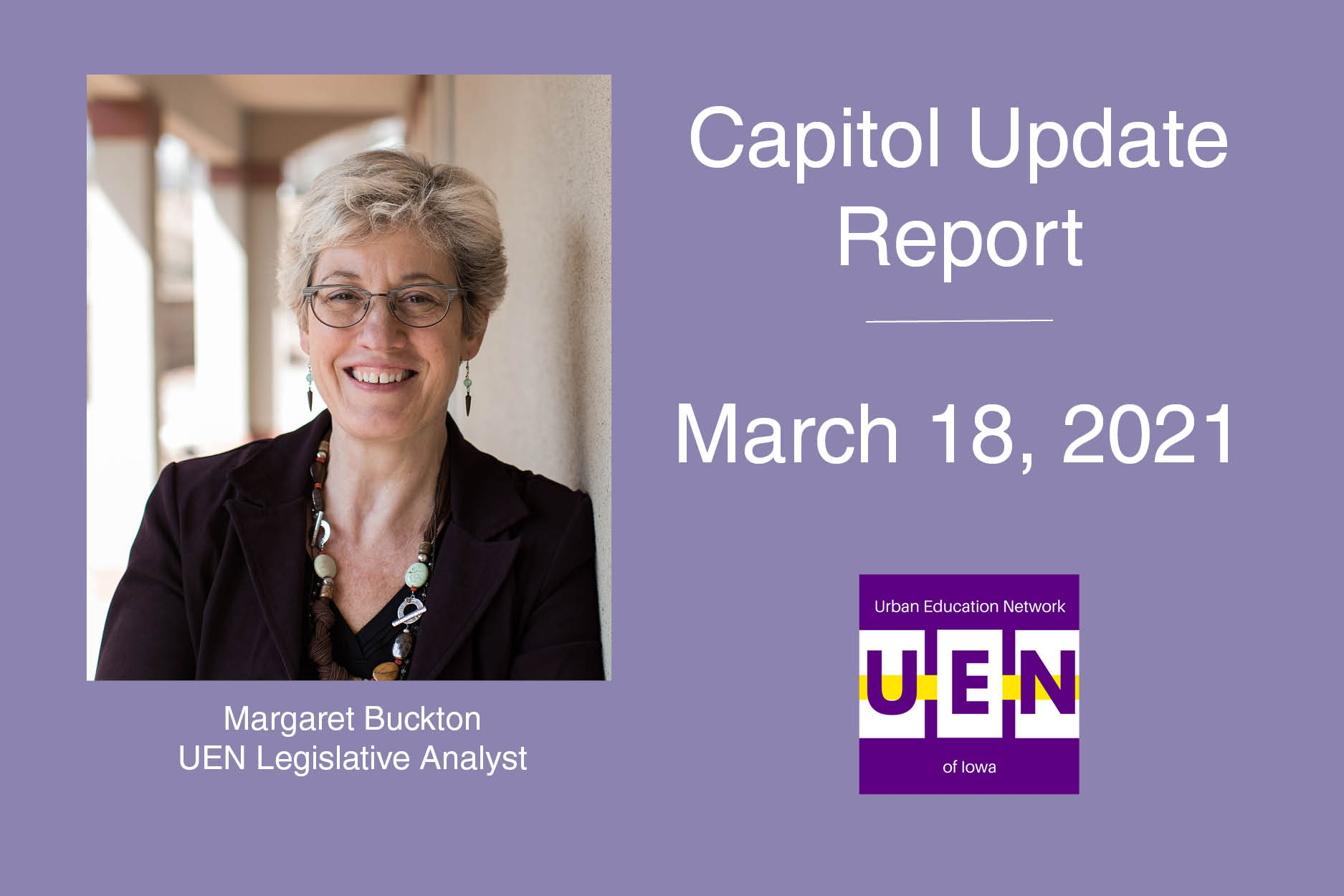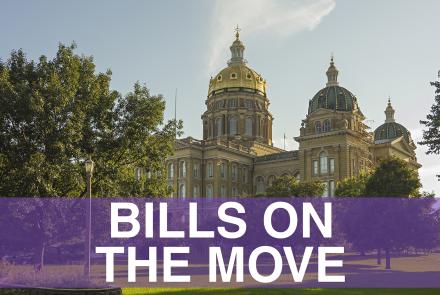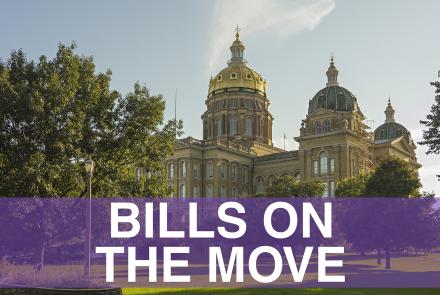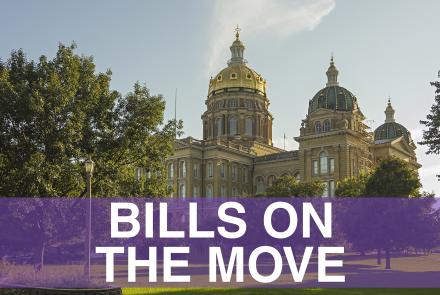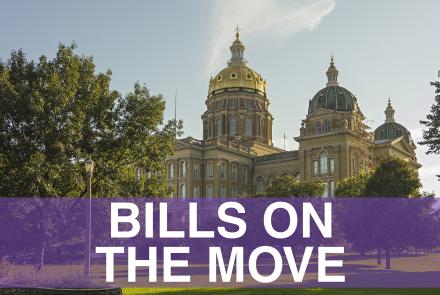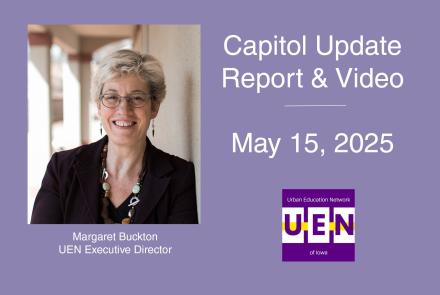Capitol Update - March 18, 2021
UEN Legislative Update
March 18, 2021
In this UEN Weekly Report from the 2021 Legislative Session, find information about:
- Next Funnel Deadline Approaching
- Charter Schools Advocacy Focus: Contact Representatives before Monday
- One-time Funding for Pandemic Instructional Costs Still Pending
- Bills on the Move: Bills approved in a chamber, by Committee or Subcommittee
Download the full March 18, 2021 Report
Legislative Funnel Deadlines
The second funnel, requiring bills out of a committee in the other chamber, is April 2. There are some exceptions, including appropriations bills, ways and mean (tax policy) bills, leadership bills and oversight committee bills. The funnels winnow down the mass volume of proposals to those that have a chance to move forward, allowing legislators, their staff, and lobby groups to focus their attention on priorities.
Advocacy Focus: Charter Schools HF 813.
HF 813 Charter Schools. UEN is opposed to this bill. If the second chartering option of charters founded by outside entities without school board approval is removed, UEN would register in support. See the February 26 Weekly Report for details of the bill. The Bill is on the House Calendar. We believe the House Republicans are likely to caucus on the bill Monday, which gives advocates a few days to reach out to House Members with our unanswered questions and objections. Here are some ideas to discuss with your representatives:
- Discrimination in Admissions Policy? The bill states that charter schools cannot discriminate in admissions policy. Discrimination is subtle, often delivered through policy. In Wisconsin, charters have strict attendance policies. If a student has 3 unexcused absences, for example, (which can be a parent not calling in the absence on time), the student is suspended. Suspension absences add to unexcused absences lead to expulsion. In other charters, parents may be required to sign a contract to volunteer 10-20 hours per week or provide additional resources, or a series of fees can be required, all insurmountable burdens for single parents or low-income families working multiple jobs. Other examples; a college prep program can require prerequisites, such as passing algebra in 8th grade, which is typically only done by talented and gifted or advanced students. A STEAM program can be open to all students with two-years’ experience playing a musical instrument. These and other policies have the effect of a discrimination policy in admitting all students.
- Public Schools? Charters across the country are created by states with the word “public” in them. Receiving state money and being under the state board of education alone do not make schools public (all nonpublic schools in Iowa meet those two criteria). The nature of being public is about transparency, representation and accountability. The charter schools in HF 813 are exempt from open meetings and public records, so not very transparent. They don’t need to have parent input or public access to inspect curriculum materials. They don’t have locally elected school boards making decisions in the open. The Founding Group board doesn’t have to be Iowa residents, and they may elect or appoint a charter governing board, that also is not required to be residents, parents, neighbors or community representatives of students in the school. Both groups could be 3 people from Florida. It's just not explicit that decision-making happens by Iowans for Iowans.
- Qualified Teachers? Although the bill says that the Charter school must hire teachers with a valid license and endorsement, since the charter is exempt from many of the curriculum requirements and standards by nature of the contract, there are still questions. For example, can substitutes with authorization be in the classroom for more than 10 days since the charters are not required to adhere to chapter 272 BOEE statute? Could a licensed teacher oversee three unlicensed teachers and be the "teacher of record" but not be the one in the classroom? there are a lot of questions remaining. We don't know if the charter school will have to report to the DE all of their employees in BEDS reporting like public schools do.
- Why would they be founded? Although evidence of community need and support is required in the application, charters are founded throughout the country based on many things. A suburb may work to create two high schools – often resulting in angst from some parents and staff. Other districts may change attendance boundaries. Others may decide to close an attendance center to balance the budget. Another district may pull back on an arts program or eliminate 11-man football. Would any of these have triggered evidence of community need and support for a charter? The State BOE has to write rules, so what evidence will be accepted is unknown, but we also know there are for-profit entities looking for their next investment. The educational management organization, whether nonprofit or for-profit, may define need and purpose differently from what we might expect of the best intended actions.
- Students with disabilities? The bill says there must be a plan to serve students with disabilities and based on comments in the House Education Committee, we expect it will work just like open enrollment. Public schools have the right to refuse a student with disabilities if they do not have the services required in the IEP or insufficient classroom space. We are assuming the charter schools may work the same way. The plan may be to serve level 1 students and those without behavior plans. The rest stay with their resident school. Across the nation, charter schools haven’t served students with disabilities, minority students, low-income or low achieving students at a level representative of the public school districts where they are located. Funding for students with disabilities is unclear – if it works like open enrollment, the charter would provide the services in the IEP and bill the resident district back. Unlike the resident district, however, the charter school wouldn’t have to publish their paid bills list, their list of salaries for staff, or make public the other costs of special education services. If the charter decides to serve the students, there will be less oversight on the expenditure, which ultimately impacts the public school’s special education deficit/property taxes.
- Oversight? There is some – but without public meetings and open records, it’s pretty tough to challenge or verify. In other states, governing board members have been “unappointed” when they asked too many questions about finances or achievement. Oversight is often in hindsight
- Sustainability? There are 7,000 charter schools operating in the nation this year. According to Forbes, over 2,500 were closed between 2001 and 2013. They were closed for financial issues, inability to deliver intended outcomes, or inability to generate the intended enrollment necessary for sustainability. Major findings of a study reviewing charter schools, reported in the Washington Post, August 2020: Of the charter schools that opened between 1998 and 2017:
- 18% had closed within 3 years of opening;
- 25% closed with 5 years;
- 40% closed within 10 years
- Only 5 of 77 groups of charters were still open after 15 years.
Every closure was a disruption for students, staff, families and the public schools to which the students enrolled when the charter went under.
Much of that shared above is further evidenced in the NEPC review of the NAPCS report. Here are details and a link to a summary if the entire review (25 pages) is too long. ISFIS Analysis of NAPCS Report - Charter School Claims, Themes and Talking Points
See the UEN Legislative Website for an updated Call to Action on Charter Schools with talking points and directions to reach out to House of Representative members now through when the bill is debated.
One-Time Funding Supplement Hearing in the Senate
HF 532 One-Time Funding Instructional Supplement: This bill as originally approved by the House directed a methodology for counting days in 100% in-person instruction, hybrid or virtual learning and would have prorated $27.2 million to schools based on the relative amount of in-person instruction provided during the first half of the 2020-21 school year, with funds provided as supplemental funding in the current fiscal year. The Subcommittee of Sens. Sinclair, Goodwin and Quirmbach met and discussed plans to amend the bill. The amendment would include some funding for AEAs which also experienced costs of providing in-person instruction while following CDC guidelines, and would change the formula to avoid the counting of days, with a per pupil distribution. The Senate amendment have the funds available to school districts in the 2021-22 school year. Sen. Sinclair also discussed the inclusion of direction to the Governor to use GEERS federal funds for PK enrollment growth expected in the fall of 2021 that will exceed the enrollment of Oct. 1, 2020. This funding would help school districts provide preschool for 4-year-olds that might otherwise be on a waiting list. UEN was opposed to the difficult House formula and is awaiting review of the amendment, but will likely switch our registration to undecided or support once we confirm what the amendment will do. The Subcommittee recommended the bill move forward, with amendment, to the full Senate Education Committee.
Bills on the Move: Senate Action
SF 260 Medicaid Reimbursements for Special Education Services: this bill requires a receiving school district to send the paperwork necessary for Medicaid reimbursement to the district of residence when a student receiving special education services is open enrolled. The Senate approved the bill 47-0, sending it to the House. UEN supports the bill.
SF 425 Open Meetings Subjects: this bill requires any deliberations or actions taken by a government within the budgetary duties of the body be subject to the open meetings laws. Requires reasonable notice to include notice to any person who has requested notice of a meeting and excludes weekends and holidays when considering the 24-hour time period for posting notices. The Senate approve the bill 30-17, sending it to the House. UEN is registered opposed.
SF 467 – Education Online Learning: this bill prohibits schools from using continuous online/remote learning unless done according to a proclamation by the Governor or as approved by Iowa Code 256.7 subsection 32 (DE approval of virtual programs) or 256.11 subsection 17 (offer and teach requirements). The bill was amended to allow for up to five virtual days for snow/inclement weather or other unforeseen emergencies. The bill also states that schools are not mandated to offer continuous online learning unless required by law to serve students with disabilities or required after a public health proclamation. The Senate approved the bill as amended 47-0; it now goes to the House. UEN supports the bill.
SF 532 Education Behavioral Analysts and Mental Health Counselors: the bill requires the Board of Education Examiners to adopt rules on a statement of professional recognition for behavioral analysts and mental health counselors by August 2021. Requires the BOEE to consult with the DE and allows emergency rules. The Senate amended and approved the bill 47-0, sending it to the House. UEN supports the bill.
SF 562 Sexual Exploitation of a Minor: this bill includes adults (18 and older) giving training or instruction to a minor outside of a school under provisions prohibiting sexual exploitation by a counselor, therapist or school employee. The bill includes firearm training, athletics and other kinds of training and defines such conduct. The bill requires the adult to be at least four years older than the minor. The Senate approved the bill 37-10, sending it to the House. UEN supports the bill.
SF 576 Inheritance Tax/Tax Triggers: this bill strikes the triggers that must be hit before certain tax cuts become effective in 2023, making those changes effective in 2023. It phases out the inheritance tax over four years, after July 2022. The Senate approved the bill 46-0, sending it to the House. The fiscal note estimates a reduction of revenues in FY 2023 of $151 million and about double that in FY 2024. The bill is also estimated to reduce income surtax amounts for school districts by $10.8 million over the five-year period. However, school districts may alter the income surtax rate or shift to property tax, so this is not a net reduction in funding for school districts. The fiscal note can be seen here https://www.legis.iowa.gov/docs/publications/FN/1216851.pdf. UEN did not register to lobby this bill, but school leaders remain watchful that the state has sufficient general fund resources in order to provide sustainable and adequate funding for Iowa schools.
SF 580 - Online Censorship Companies: this bill originally included a prohibition that political subdivisions (including schools) not have contracts with big technology companies that censored content, but through the process, those provisions were removed from the bill. The bill does restrict the ability of local governments to provide economic development incentives going forward for such companies and creates enforcement and pay-back mechanisms. UEN is registered as undecided on the bill. The Senate approved it 30-17, sending it to the House. UEN was originally opposed when the bill impacted school contracts for services. With the removal of those provisions, UEN is now registered as undecided.
HF 756 Weapons Matters: this bill changes gun permit and carry laws. UEN is specifically concerned about Division II, which allows the following individuals to carry or transport a firearm on school property:
• A person who has been specifically authorized by the school to carry or transport a firearm for a lawful purpose.
• A peace officer, including a peace officer who has not been certified and a federal officer when the officer’s employment requires going armed, regardless of whether the officer is on duty.
• A member of the U.S. Armed Forces or National Guard, when the weapon is carried in connection with the member’s official duties. Fiscal Note Fiscal Services Division 2
• A correctional officer, as part of the officer’s official duties.
• A person who for any lawful purpose carries an unloaded pistol, revolver, or other firearm inside a closed and fastened container or securely wrapped package that is too large to be concealed.
The fiscal note has an assumption “that any property and employee liability insurance claims arising out of the expansion of the group of persons allowed to carry a firearm on school grounds will likely be covered by existing school liability insurance policies.” If there are incidents and claims, a likely increase in premiums will follow, increasing needed revenues to the Management Fund. UEN is registered opposed to the bill. A companion bill SF 535 has similar provisions and is on the Senate Calendar.
HF 744 College and School District Free Speech Rights: Section 3 of the bill applies to school districts. It requires school boards to protect the intellectual freedom of the school district’s students and practitioners and establish and publicize policies that protect students and faculty from discrimination based on speech. Prohibits retaliation against a person who files an associated complaint and provides whistle-blower protections if the complainant is an employee of the school district. Requires the school board or court, if an employee is found to have discriminated against a student or employee in violation of this section, to report to the BOEE and the BOEE to conduct a hearing, which may result in disciplinary action and the employee’s employment may be terminated. The House approved the bill 97-1, sending it to the Senate. UEN is registered as undecided.
HF 802 Racism/Diversity Training: this bill establishes requirements for diversity training, on racism and sexism, in schools and colleges including prohibiting teaching that Iowa is fundamentally racist or sexist. The bill prohibits political subdivisions, including school districts, from providing any mandatory staff training from teaching, advocating, acting upon or promoting divisive concepts and race or sex scapegoating but does not prevent an employee or contractor who provides mandatory training from responding to questions regarding divisive concepts raised by participants in the training. The bill was expanded to cover state and local governments. The bill also prohibits teaching of divisive concepts or race or sex scapegoating in the curriculum.
Definitions: the bill defines “divisive concepts” to include: 1) that one race or sex is inherently superior to another race or sex, 2) that the USA and the state of Iowa are fundamentally or systemically racist or sexist, 3) that an individual, by virtue of their race or sex, is inherently racist, sexist, or oppressive, whether consciously or unconsciously, 4) that an individual should be discriminated against or receive adverse treatment solely or partly because of the individual’s race or sex, 5) that members of one race or sex cannot and should not attempt to treat others without respect to race or sex, 6) that an individual’s moral character is necessarily determined by the individual’s race or sex, 7) that an individual, by virtue of their race or sex, bears responsibility for actions committed in the past by other members of the same race or sex, 8) that any individual should feel discomfort, guilt, anguish, or any other form of psychological distress on account of that individual’s race or sex, 9) that meritocracy or traits such as a hard work ethic are racist or sexist, or were created by a particular race to oppress another race and 10) any other form of race or sex scapegoating or any other form of race or sex stereotyping. The bill also defines “race or sex scapegoating” to mean assigning fault, blame, or bias to a race or sex, or to members of a race or sex because of their race or sex, or claiming that, consciously or unconsciously, and by virtue of persons’ race or sex, members of any race are inherently racist or are inherently inclined to oppress others, or that members of a sex are inherently sexist or inclined to oppress others and states that “race or sex stereotyping” means ascribing character traits, values, moral and ethical codes, privileges, status, or beliefs to a race or sex, or to an individual because of the individual’s race or sex.
Provisions relating to schools: the bill allows school districts to continue training that fosters a workplace and learning environment respectful of all employees and students. Requires the superintendent to ensure any curriculum or mandatory staff or student training does not teach, advocate, act upon, or promote divisive concepts, but does not prevent an employee or contractor who teaches any curriculum or who provides mandatory training from responding to questions regarding divisive concepts raised by participants in the training. The bill requires district diversity and inclusion efforts shall discourage students of the school district from discriminating against another by color, race, ethnicity, sex, gender, political ideology, or any other characteristic protected under the federal Civil Rights Act of 1964, Pub. L. No. 88-352, as amended, and applicable state law. The bill also requires districts to prohibit employees from discriminating against students or other employees. The bill also protects employees against retaliation for protecting the free speech rights of students.
The bill states that is should not be construed to do any of the following: 1) Inhibit or violate the first amendment rights of students or faculty, or undermine a school district’s duty to protect to the fullest degree intellectual freedom and free expression, 2) Prevent a school district from promoting racial, cultural, ethnic, intellectual, or academic diversity or inclusiveness, provided such efforts are consistent with the provisions of this section, chapter 216, and other applicable law, 3) Prohibit discussing divisive concepts as part of a larger course of academic instruction, 4) Create any right or benefit, substantive or procedural, enforceable at law or in equity by any party against the state of Iowa, its departments, agencies, or entities, its officers, employees, or agents, or any other person or 5) Prohibit a state or federal court or agency of competent jurisdiction from ordering a training or remedial action containing discussions of divisive concepts as a remedial action due to a finding of discrimination, including discrimination based on race or sex.
The House approved the bill as amended 59-38, sending it to the Senate. UEN is registered as undecided.
Committee Action this Week:
HF 642 Sharing Special Education Directors: this bill would add special education director to the list of Operational Sharing Incentive positions, at a weighting of 3.0 students, or just over $21,000 in FY 2021 regular program district cost terms. The fiscal note assumes 43 school districts will take advantage of the sharing, which then estimates an impact of $787,125 in state aid and $93,750 in property taxes to fund the weighting. That would be an average property tax impact of $2,180 per district. The bill was approved unanimously in the House Appropriations Committee and moves forward to the House Calendar. UEN is registered as undecided on this bill.
HF 796 Broadband Grants: this bill creates tiers of internet speed, provides for incentives for the expansion of high-speed internet across the state and defines areas of need. The bill was approved by the House Appropriations Committee and moves to the House Calendar. UEN supports the bill.
HF 808 Education Practices: this bill includes several provisions from the Governor’s School Choice bill, SF 159. UEN was originally opposed to the bill, which included a division that mandated a statewide student information system and significantly expanded the tuition and textbook tax credit thresholds and also added home school expenses as eligible. The division on the mandated student information system was removed in the House Education Committee, and they stepped back the tax credits significantly from the Governor's proposal, so the expansion is less extreme. UEN supports the flexibility provisions allowing use of TLC ending balance for flex account and creating a new innovative program waiver. There are several more technical open enrollment provisions that were passed earlier as stand-alone bills in the House and changes to athletic eligibility waiting period for open enrollment. The bill was approved on party lines by the House Ways and Means Committee and moves to the House Calendar. See the March 5 weekly report for a more detailed bill description. UEN is now registered as undecided on the bill.
HF 288 Diversity Plan Open Enrollment Regulation Ban: this bans the ability of five districts with voluntary diversity plans (Davenport, Des Moines, Postville, Waterloo and West Liberty) to regulate open enrollment out of the district based on their plans, which currently review socioeconomic status (income) or English-language learner classification as metrics to consider. None of these districts uses race as a metric, which was banned as a sole measure of consideration by a Supreme Court decision in 2007.
The goals of the diversity plans are to preserve a mix of diversity and prevent segregation of schools in these districts. There is a solid research base that shows a concentration of poverty which hits a tipping point at 50-60% and segregated schools negatively impacts student achievement, economic growth and workforce diversity for such communities. See the UEN Issue Brief explaining the issue and showing data on poverty, minority, open enrollment and certified enrollment for these districts and for similar districts without voluntary diversity plans.
The Senate Education Committee this week approved the bill, sending it to the Senate Calendar. Sen. Sinclair anticipated an amendment would be forthcoming with a date change when debated in the Senate. UEN is registered in opposition.
HF 675 – Substitute Teacher Authorization: this bill requires the Board of Education Examiners to create a substitute teacher authorization, allowing a substitute to teach no more than 10 consecutive days in a 30-day period in one job assignment, except in the driver’s education classroom. The bill allows a school district administrator to file a written request with the BOEE for an extension of the 10-day limit on the basis of documented need and benefit to the instructional program. The BOEE is required to review the request and provide a written response. Specifies that the authorization not require less than the successful completion of an associate degree or 60 undergraduate semester hours, or the equivalent, from a college or university accredited by an institutional accrediting agency recognized by the United States DOE. The bill was approved in the Senate Education Committee, moving it to the Senate Calendar. UEN supports the bill.
Subcommittee Action this Week
SF 466 Occupational Therapists and Concussions: the bill allows occupational therapists to serve as the medical professional regarding concussion management at an athletic event. The Subcommittee of Representatives Bush (C), Bradley, and Mascher recommended the bill move forward to the full House Human Resources Committee. UEN is registered undecided the bill.
SF 265 School Promotions by Parent Consent: this bill would have required school districts to retain students in their prior grade based on parent request by Aug. 15 of 2021, providing a reset on the 2020-21 COVID school year. Members of the education committee, including UEN, testified that schools already work with parents in determining placement of students and there was no need for the bill. Also, the Aug. 15 deadline was too late for scheduling and staffing processes. Reps. Wheeler (C), Salmon, and Staed agreed and did not move the bill forward. However, late in the afternoon on Thursday, there is a note on the legislative website that the Subcommittee approved the bill 2:0, moving it forward to the full committee. Stay tuned. UEN is registered as undecided on the bill.
HF 431 Telehealth Phone Calls: this bill would allow audio-only telehealth or telemedicine by healthcare professionals. The Subcommittee of Sens. Costello (C), Mathis, and Sweeney recommended the bill move forward to the full Senate Human Resources Committee. UEN supports the bill.
HF 770 Teacher PD for CEUs: this bill would require the licensure renewal requirements set by the BOEE to allow teachers engaging in professional development related to their individual professional development plan and under the supervision of their evaluator to receive credit towards their licensure requirements. Also, courses offered by a professional development program licensed by the BOEE or by a practitioner preparation institution or the AEAs as approved by the state BOE will also count for renewal credit. The bill requires that no more than 50% of the renewal credit be earned through these new avenues. UEN is registered in support. The Subcommittee of Sens. Cournoyer, Taylor and Giddens recommended the bill move forward to the full Senate Education Committee.
Connecting with Legislators:
Find biographical information about legislators gleaned from their election websites on the ISFIS site here: http://www.iowaschoolfinance.com/legislative_bios Learn about your new representatives and senators or find out something you don’t know about incumbents.
Find out who your legislators are through the interactive map or address search posted on the Legislative Website here: https://www.legis.iowa.gov/legislators/find
To call and leave a message at the Statehouse during the legislative session, the House switchboard operator number is 515.281.3221 and the Senate switchboard operator number is 515.281.3371. You can ask if they are available or leave a message for them to call you back.
Advocacy Resources:
UEN recently launched a new website. More tools and resources will be added, but go to www.uen-ia.org to find Advocacy Resources such as Issue Briefs, UEN Weekly Legislative Reports and video updates, UEN Calls to Action when immediate advocacy action is required, testimony presented to the State Board of Education, the DE or any legislative committee or public hearing, and links to fiscal information that may inform your work. The latest legislative actions from the statehouse will be posted at: www.uen-ia.org/blogs-list. Check out the UEN Advocacy Handbook linked here, and also available from the subscriber section of the UEN website
Thanks to our UEN Corporate Sponsors:
Special thank you to your UEN Corporate Sponsors for their support of UEN programs and services. You can find information about how these organizations may help your district on the Corporate Sponsor page of the UEN website at https://www.uen-ia.org/uen-sponsors.
 |
Contact us with any questions, feedback or suggestions to better prepare your advocacy work:
Margaret Buckton
UEN Executive Director/Legislative Analyst
margaret@iowaschoolfinance.com
515.201.3755 Cell


